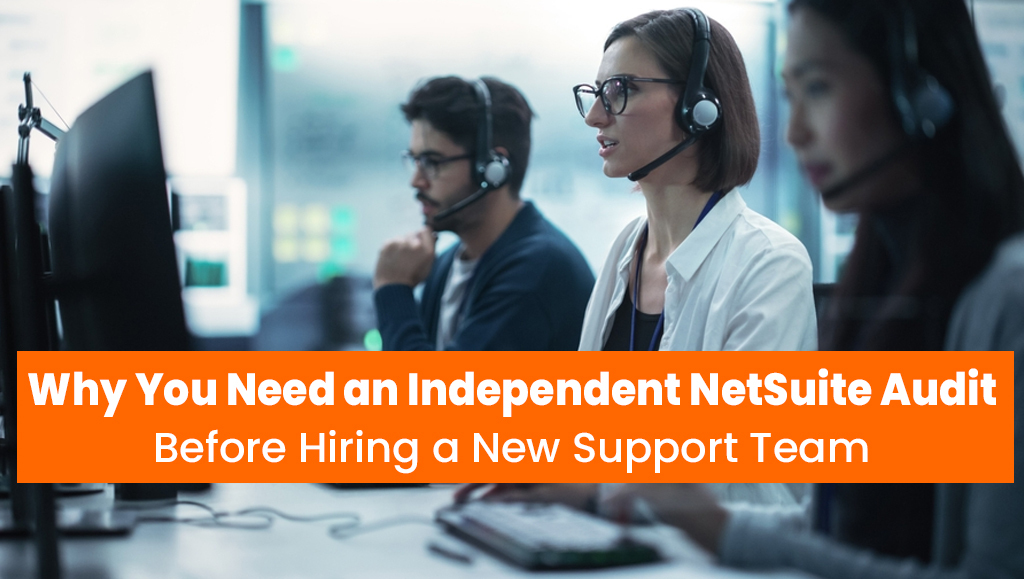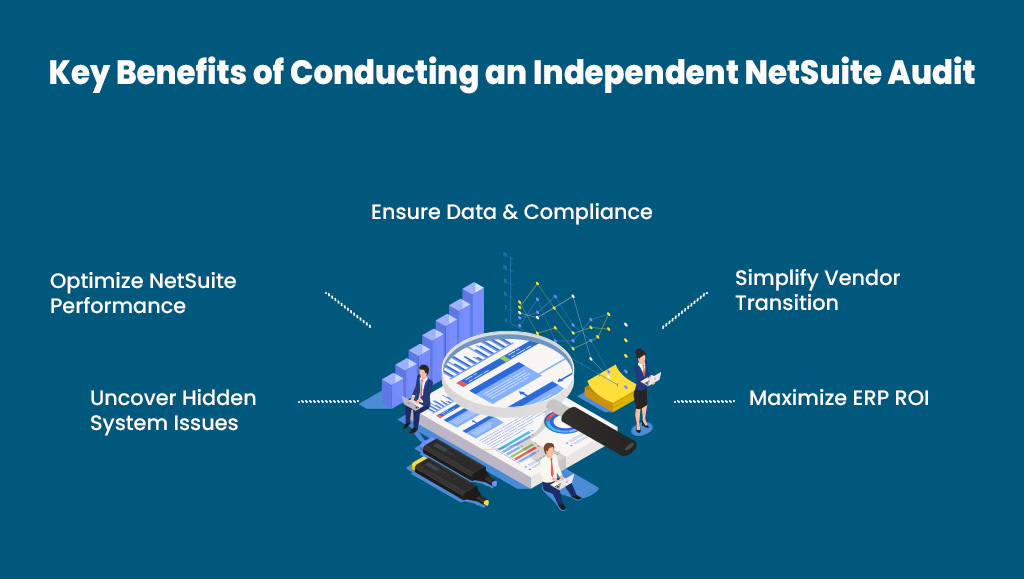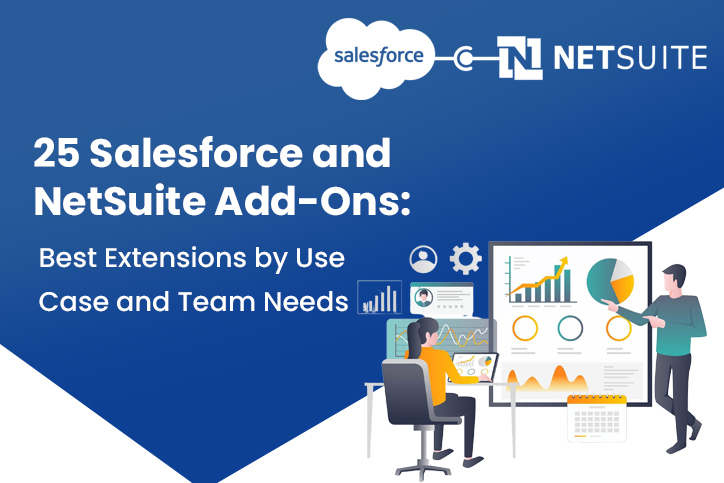Is your NetSuite system not performing as expected, slow dashboards, broken integrations or inaccurate reports? Many businesses assume the solution is to replace their NetSuite support team but that’s not always the smartest first step.
Before switching providers, conducting an independent NetSuite audit can help you understand what’s really wrong with your setup. It reveals inefficiencies, hidden errors and misconfigurations that could be costing your business time, money and productivity.
In this blog you’ll learn how to audit your NetSuite system what to check during an audit and why it’s crucial before hiring a new NetSuite support services provider.
The Core Problem: Why Businesses Struggle Even After Hiring New NetSuite Teams
Many mid- to large-scale organizations invest in NetSuite expecting seamless automation and visibility across operations. But over time, challenges start to surface:
- Dashboards display outdated or inconsistent data
- Workflows take longer to execute than expected
- Integrations with CRM or eCommerce platforms fail
- Reports don’t align with financial statements
- Customizations make upgrades more complex
Often these issues don’t stem from NetSuite itself, but from how it was configured, customized or managed.
Replacing your NetSuite partner without understanding these root causes can lead to repeating the same mistakes with a new team.
That’s where an independent NetSuite system audit becomes invaluable, it provides a clear, unbiased view of your ERP environment before you invest further.
What Is a NetSuite Audit?
A NetSuite audit is a structured evaluation of your ERP instance, covering system configuration, user access, integrations, workflows and data integrity.
It identifies where inefficiencies, compliance risks or incorrect setups exist, ensuring your system is optimized for business growth.
Think of it as a health check for your ERP system, revealing what’s working, what’s not and what needs improvement.
Why Conduct an Independent NetSuite Audit Before Hiring a New Support Team?
An independent audit ensures you get an objective view, not influenced by the team currently managing your system or the one trying to win your business.
Here’s why it’s critical:
1. Unbiased Assessment of Your Current System
An audit performed by a neutral expert (not your support team or a potential vendor) provides you with transparent insights into the strengths and weaknesses of your configuration.
It enables you to discover such issues as stale scripts, redundant roles or broken integrations that internal teams may have overlooked.
2. Avoid Paying for the Same Problems Twice
If you do not have an audit, your new NetSuite support provider can simply take over a situation that is poorly configured without your knowledge, ask you to pay for the fixes and make the environment more complex.
An independent audit positions them clearly at the starting point, thus you pay only for the improvements that deliver value.
3. Faster Transition and Knowledge Transfer
When changing support teams, there usually are gaps in information. An audit serves as a layer of documentation, describing the structure of your system, what is custom and where the dependencies are, and therefore, the onboarding process is much easier.
4. Performance and ROI Optimization
A detailed audit uncovers opportunities to:
- Simplify redundant workflows
- Reduce licensing costs
- Optimize scripts and dashboards
- Improve integration performance
This ensures you extract maximum value from your NetSuite investment.
5. Data Security and Compliance Validation
Audits help ensure your system aligns with internal governance and external regulations (like SOX or GDPR). It validates role permissions, data access policies and audit trails protecting you from compliance risks.
How to Audit Your NetSuite System: A Step-by-Step Framework
A comprehensive NetSuite system audit follows a systematic, multi-layered approach. Below is a proven framework used by expert NetSuite integration partners to deliver accurate insights:
Step 1: System Configuration Review
Examine modules, workflows and setup configurations. Check for:
- Custom fields and forms that are no longer used
- Outdated scripts affecting performance
- Misconfigured tax or accounting settings
Step 2: Role and Permission Analysis
Ensure users have appropriate access, no more, no less. Look for:
- Duplicate roles or overlapping permissions
- Unused user accounts
- Missing segregation of duties
Step 3: Integration Health Check
Assess data flow between NetSuite and other systems like CRM, Shopify or BI tools. Key checks include:
- Failed API calls or sync errors
- Custom connector performance
- Integration logging and monitoring
Step 4: Data Quality & Integrity Audit
Evaluate the accuracy and consistency of key data sets such as:
- Customer records
- Inventory and order data
- Financial transactions
This step identifies duplicates, incomplete entries and mapping errors.
Step 5: Customization and Script Review
Custom scripts, workflows and SuiteScripts often cause performance issues if not optimized. Audit these for:
- Script execution time
- Hard-coded logic
- Upgrade compatibility
Step 6: Reporting and Dashboard Validation
Verify if business-critical dashboards and reports pull correct data. Identify misaligned KPIs or metrics that create confusion for decision-makers.
Step 7: Performance Benchmarking
Compare system speed, data load times and API response rates against NetSuite performance benchmarks to highlight bottlenecks.
Step 8: Compliance and Security Assessment
Ensure your instance meets security and regulatory requirements through periodic access reviews, audit trail checks and encryption validation.
What to Check in a NetSuite System Audit
Here’s a quick checklist of what every organization should review:
| Audit Area | Key Checks | Why It Matters |
|---|---|---|
| Configuration | Custom fields, forms, workflows | Prevent redundancy and simplify upgrades |
| Integrations | API failures, sync errors | Ensure smooth data flow across systems |
| Data Integrity | Duplicates, mapping errors | Improve reporting accuracy |
| Security | User roles, permissions | Mitigate access-related risks |
| Performance | Load time, script efficiency | Enhance user experience |
| Compliance | SOX/GDPR readiness | Avoid legal or audit penalties |
This structured audit ensures every layer, from system setup to compliance, is functioning optimally.
Common Pitfalls Revealed During NetSuite Audits
Audits often uncover patterns that many companies face. Here are the most frequent findings:
- Over-customization: Too many scripts or workflows leading to slow performance
- Disconnected systems: Poorly maintained integrations causing data silos
- Unsecured access: Users having administrative rights unnecessarily
- Stale configurations: Modules set up during go-live but never updated since
- Unclear ownership: Lack of governance on who manages system changes
Identifying these early through an audit prevents repetitive failures with future support teams.
The ROI of an Independent NetSuite Audit
| Benefit | Impact on Business |
|---|---|
| Reduced downtime | 20–30% faster system performance |
| Lower maintenance costs | Avoid redundant fixes and vendor rework |
| Improved compliance | Strengthened data security |
| Enhanced reporting | Real-time decision-making accuracy |
| Smoother transitions | Clear roadmap for new support vendors |
The average company sees measurable ROI within 3–6 months post-audit through optimized performance and reduced inefficiencies.
How to Maximize the Value of Your Audit
To get the most out of your audit process:
- Engage an independent NetSuite specialist (not your existing vendor)
- Document every finding with detailed recommendations
- Prioritize fixes by impact, start with data and integration issues
- Review access roles quarterly for compliance
- Leverage audit findings as a roadmap for your new support provider
These steps ensure your next phase of NetSuite management is strategic, not reactive.
When to Schedule a NetSuite Audit
You don’t need to wait for a crisis to audit your system. Consider one if:
- You’re planning to switch support partners
- Your system performance has declined
- Users are reporting recurring data or access issues
- You’ve added new modules or integrations recently
- It’s been over a year since your last audit
Proactive audits ensure continuous improvement and long-term ERP stability.
How Leading Businesses Benefit from Regular NetSuite Audits
Real-world case studies show the impact:
- Manufacturing Firm: Post-audit reduced report generation time by 60% after cleaning redundant scripts.
- Retail Enterprise: Improved data sync accuracy by 45% through integration optimization.
- Professional Services Company: Eliminated $80,000 in annual costs by reconfiguring underused modules.
Regular audits not only enhance performance but also drive cost efficiency and scalability.
Ready to Future-Proof Your NetSuite Investment?
An independent NetSuite audit is not just a technical exercise, it’s a business strategy move. It gives you the clarity and control you need before bringing a new NetSuite support services partner onboard.
Whether you’re struggling with failed implementations or planning a system upgrade, a structured audit helps ensure your next phase of ERP management is built on a solid foundation.
SoftArt Solutions Inc., a trusted global NetSuite integration partner, empowers businesses to identify gaps, optimize configurations and streamline operations through comprehensive audit and consulting services.
Ready to simplify your ERP journey and maximize ROI? Schedule a free consultation with SoftArt today.
Frequently Asked Questions:
- What is a NetSuite system audit and why is it important?
Ans. A NetSuite audit reviews your ERP setup for errors, inefficiencies and compliance gaps. It ensures your system runs smoothly before hiring a new support team.
- How often should businesses perform a NetSuite audit?
Ans. Ideally, conduct a NetSuite audit once a year or before major upgrades or vendor changes. Regular audits keep your system optimized and secure.
- What should I check during a NetSuite system audit?
Ans. Focus on configurations, integrations, data accuracy and user roles. These areas reveal the key performance and security issues affecting your system.
- Who should conduct an independent NetSuite audit?
Ans. Always choose a neutral, certified NetSuite integration partner for unbiased insights. Independent audits ensure transparency and actionable recommendations.
- Can a NetSuite audit help improve ROI and system performance?
Ans. Yes, it identifies inefficiencies and cost leaks, improving speed, accuracy and system value. A good audit directly boosts NetSuite ROI.









